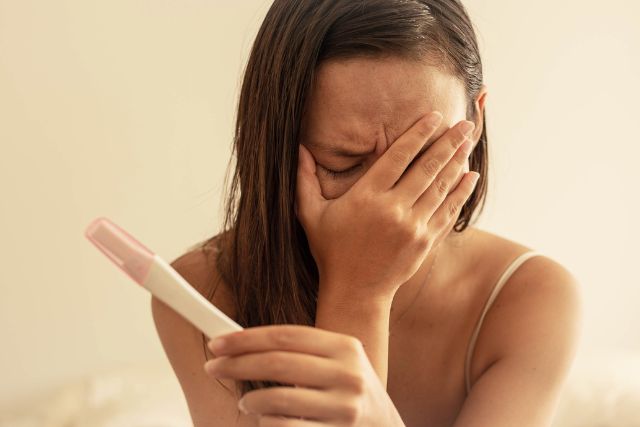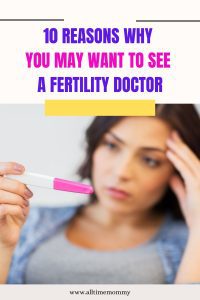Are you wondering when to see a fertility doctor? For most women in their twenties and early thirties, getting pregnant is never an issue. Studies show that 1 in 3 women having regular sex without contraceptives can conceive within the first three months of trial.
According to research,
- For women aged 19 to 26 – 92% will conceive within the first year and 98% after two years.
- For women aged 35 to 39 – 82% will conceive within the first year and 90% after two years.
But what happens when this doesn’t go as you expect? Well, you may think of seeking a specialist’s help. Below are some reasons why you may want to see a fertility doctor.
When To See a Fertility Doctor
1. You Have Stopped Using Birth Control for Over a Year, but, You Haven’t Conceived
Averagely, it takes 6 to 12 months for a couple to conceive.
If you’re not on contraceptives, and it’s past 12 months, yet you have not conceived, it may be a good reason for you to see a fertility specialist.
Ideally, you should stop using birth control a month earlier before trying to conceive. But, this should not worry you, especially if you are using oral contraceptives and having regular sex.
According to Dr. Alexandra Sowa, M.D., an internist in New York City, “The important thing to note about oral contraceptives is that once you stop, ovulation can return immediately. The synthetic hormones leave your system in a few days so that you can get pregnant the first month off the pill,”
2. You Are 35 Years and Above & Trying so Hard
Age affects fertility. As women get older, the quantity and quality of their eggs drop. This factor can be a hindrance to conceiving hence;
- If you are over 35 years old and have been trying to get pregnant for one to two years without success, you might consider seeing a fertility specialist.
3. You are Experiencing Abnormal Periods
Normal menstruation lasts four to seven days, with a period length of 21 to 35 days. Sometimes, though, this timeframe can differ. However, if you notice some abnormal factors during your period, you should seek specialist help. This abnormal menstrual issues include;
- Your Periods take less than 21 days or more than 35 days apart
- You often miss three or more periods consecutively.
- Your Menstrual flow is heavy with some clots, or it’s lighter than usual.
- Your Periods last longer than seven days.
- You have an abnormal or foul-smelling vaginal discharge
- Your periods come with pain, cramping, nausea, or vomiting.
- You experience the symptoms of toxic shock syndrome. This includes a high fever, dizziness, vomiting, and diarrhea.
These symptoms may mean menstruation disorders such as:
- Amenorrhea. This refers to a condition whereby your periods have stopped completely. The absence of a period for three consecutive months can be abnormal. This should only happen when a woman is pregnant, breastfeeding, or going through menopause.
Also, it can happen in teenagers who haven’t started menstruating by age 15 or 16. Yet still, they need to see a specialist.
- Dysmenorrhea. This refers to painful periods and severe menstrual cramps that can cause so much discomfort.
- Abnormal uterine bleeding
Having an irregular cycle or abnormal periods can contribute to infertility. Often, the abnormal period is an indicator of irregular ovulation.
Irregular ovulation can happen due to many issues. This includes polycystic ovary syndrome (PCOS), obesity or being underweight, and thyroid issues.
If left untreated, this issues can cause infertility or delayed conception.
Related: The Stages of Menstrual Cycle Every Woman Should Know
4. You Have Had Two or More Miscarriages
Miscarriages happen when the baby dies in the womb within the 20 weeks of pregnancy.
According to research, 10% to 15% of pregnancies end up in miscarriage yearly. Although there are so many causes, the chromosome problem takes the lead. Others include chronicle infection and uterus or cervical problems.
In some rare cases, a woman can have a miscarriage before knowing that she is pregnant.
In case you’ve had two or more miscarriages, you should consider working with a fertility specialist. They will help in monitoring your health while reducing the risk of having a miscarriage. If there is a more significant condition causing these miscarriages, you want to be aware of it early enough to take precautions.
5. Your Partner Has Erectile Dysfunction
Erection is influenced by hormonal changes, psychological factors, or physical issues. If your man experiences regular erectile dysfunction, it may be a good reason to visit a fertility specialist.
Difficulty to get or keep an erection interfere with sexual intercourse. It can also be a sign of an underlying issue.
Also, having changes during ejaculation, such as a drop in volume, may be a sign of an underlying issue related to a man’s fertility.
Changes in testicles
Healthy testicles produce quality sperms and are a sign of male fertility. Small or firm testicles that feel “tight” may be another sign of hormonal issues.
Always look out for swollen, painful, or tender testicles as it may be a sign of underlying health problems, such as an infection. This can negatively affect sperm quality and male fertility.
6. A History of Sexually Transmitted Infections
Sexual Transmitted Infections can affect your reproductive system. STIs like Chlamydia, Gonorrhea, and syphilis can cause fertility problems which lead to delay in conception.
Often, some of these infections have no symptoms. You can thus live with it for some time without realizing it.
For instance, Chlamydia causes inflammation of the urethra and cervix. Whereas, Gonorrhea can lead to pelvic inflammatory disease (PID).
Delayed treatment of this infection affects the uterus, fallopian tubes, and ovaries by causing pelvic inflammatory disease (PID).
Untreated PID can result in scarring and adhesions (bands of scar tissue). This scarring leads to serious health problems such as chronic pelvic pain and fertility issues.
Symptoms of PID include:
- pains in the lower abdomen
- intensive pain during sexual intercourse
- heavy bleeding during menstruation
- painful periods
- Fever.
STIs are prevalent infections. The earlier you treat, the lesser harm it does to your body.
If you have had unprotected sex and have symptoms of STIs, see your doctor for a checkup.
Also, ensure that you have an STI test before trying for a baby. This reduces the risk of passing an infection on to your partner or child.
7. You Have a Chronic Medical Condition
Chronic illness affects major body organs such as the heart, lungs, kidneys, or brains. When your body is fighting a chronic disease, it may affect your reproductive organs significantly.
For instance, thyroid disorders and diabetes may suppress ovulation.
It can also affect the production of sperm in men or lower the quality, reducing the chances of pregnancy.
A chronic liver, Cancer, or kidney disease can impair fertility in various ways.
Cancer affects infertility by:
- Destructing healthy ovarian tissue
- Damaging parts of the female reproductive organs because of chemotherapy radiation.
- Chemotherapy can also decrease the number of oocytes, leading to infertility.
In men, Cancer:
- Disrupts hormone production
- This leads to the production of Unhealthy sperms.
- Chemotherapy can affect sperms as well.
This chronic illness includes;
- Diabetes
- Genetic disorders
- Heart disease
- Hypertension
- Sickle cell disease
- Kidney disease
- Thyroid condition
While this illness can harm one’s healthy, early diagonalization can make it manageable. You should, thus, visit a fertility specialist for a medical checkup.
8. You are a Smoker or Use Drugs such as Alcohol
Drug abuse in women can disrupt normal hormonal production. They also affect the menstrual cycle, ovulation, and the reproductive tract, such as the cervical.
One study indicates that smoking, drinking alcohol, or using recreational drugs reduces fertility in women by 50%.
Tobacco thickens cervical mucus. It can also block sperm from reaching the egg. Further, studies reveal that Tobacco use in women can delay pregnancy by more than a year.
If you are using these drugs, it’s proper to visit a fertility specialist for professional advice.
9. Prolonged Use of Antidepressants and Tranquillizers
Medications such as antidepressants, tranquillizers, calcium channel blockers, narcotics, and anti-cancer drugs are associated with low fertility.
Recent studies suggest that antidepressants may reduce the probability of a woman conceiving naturally. This is prominent, especially to those with a history of depression.
However, this study advocates for further research to differentiate the extent of damage of these drugs to fertility instead of underlying depression.
10. Exposure to Radiation, Lead, Toxic fumes, and Pesticides
Constant exposure to pesticides in women can cause a decrease in fertility. Studies show that this toxic fumes may cause
- Disruption of hormonal function
- Spontaneous abortions,
- Development abnormalities
- Stillbirth,
- Ovarian disorders
- Premature birth,
- Low birth weight
Also, getting abdominal or pelvis radiation therapy can cause infertility. But, this is dependent on the intensity of radiation.
High doses or intensive radiation can destroy eggs in the ovaries, leading to infertility or early menopause.
Takeaway
Planning for a baby is an exciting thing for couples. You should, thus, not allow delays in conception to rob you of your parental joy. Plan and start the journey together as a couple by seeking help where necessary.
DISCLAIMER
The information contained in this post is for general information purposes only. I’m not a health practitioner and as such, this information should not be used as a substitute for consultation with your professional service provider.
UP NEXT: 16 Tips for Increased Chances of Conceiving



